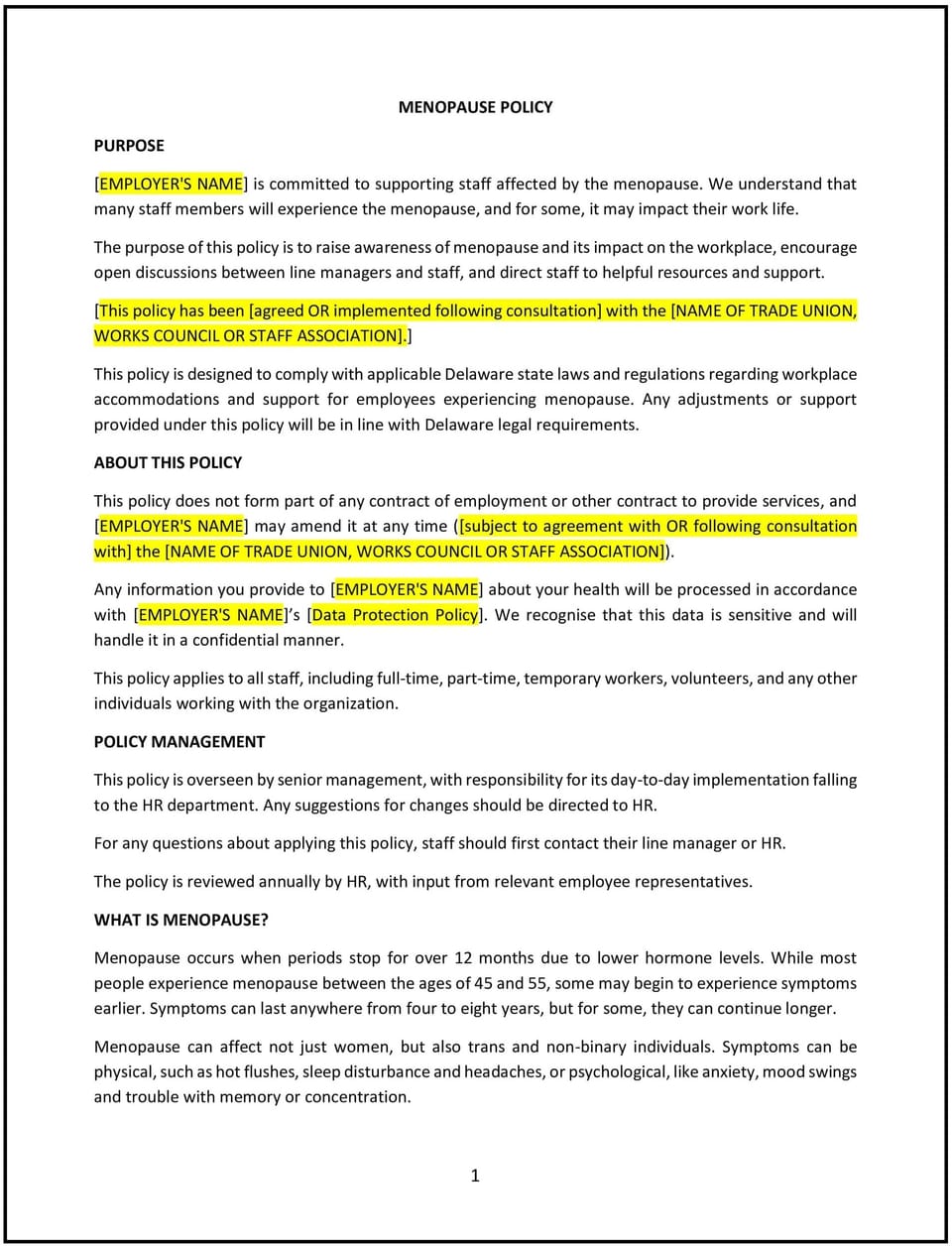Menopause policy (Delaware): Free template

Menopause policy (Delaware)
A menopause policy helps Delaware businesses support employees experiencing menopause by providing clear guidelines for workplace adjustments, open communication, and accommodations. This policy fosters inclusivity, enhances employee well-being, and ensures compliance with Delaware labor laws related to health and non-discrimination.
By implementing this policy, businesses can create a supportive environment, promote employee retention, and reduce workplace stigma surrounding menopause.
How to use this menopause policy (Delaware)
- Create an open culture: Encourage open and respectful conversations about menopause to reduce stigma and foster understanding.
- Provide accommodations: Offer adjustments such as flexible work schedules, access to cool workspaces, or additional breaks to support employees’ needs.
- Train managers: Equip managers with the knowledge to address menopause-related concerns sensitively and supportively.
- Ensure confidentiality: Protect employees’ privacy by handling menopause-related discussions and accommodations discreetly.
- Include in health initiatives: Integrate menopause awareness into broader workplace wellness programs to promote employee health and well-being.
- Monitor effectiveness: Regularly review accommodations and feedback to ensure the policy meets employees’ needs effectively.
Benefits of using this menopause policy (Delaware)
This policy offers several benefits for Delaware businesses:
- Promotes inclusivity: Creates a workplace environment that supports employees experiencing menopause, fostering equity and respect.
- Enhances well-being: Helps employees manage menopause-related symptoms, improving their overall work experience and productivity.
- Reduces stigma: Encourages open dialogue about menopause, normalizing it as part of workplace conversations on health.
- Supports retention: Demonstrates the company’s commitment to supporting employees, reducing turnover and attracting diverse talent.
- Ensures compliance: Aligns with Delaware laws related to workplace health and non-discrimination, minimizing legal risks.
Tips for using this menopause policy (Delaware)
- Communicate the policy clearly: Ensure all employees are aware of the policy and its role in supporting workplace inclusivity.
- Encourage feedback: Provide employees with opportunities to share their experiences and suggestions for improving support.
- Integrate awareness: Include menopause education in diversity and inclusion or health and wellness initiatives.
- Provide resources: Offer access to counseling, support groups, or educational materials on managing menopause symptoms.
- Update regularly: Review the policy to reflect changes in Delaware labor laws, workplace practices, or employee needs.
Q: Why is a menopause policy important for my business?
A: This policy supports employees experiencing menopause, reduces stigma, enhances well-being, and ensures compliance with Delaware labor laws related to workplace health and inclusivity.
Q: What types of accommodations are included in this policy?
A: Accommodations may include flexible schedules, temperature-controlled workspaces, access to private rest areas, or additional breaks as needed.
Q: How can managers support employees experiencing menopause?
A: Managers can provide support by fostering open communication, offering reasonable adjustments, and handling menopause-related discussions with sensitivity and confidentiality.
Q: How does this policy promote inclusivity?
A: The policy normalizes conversations about menopause, integrates it into workplace wellness programs, and ensures employees have equal opportunities and support.
Q: How often should this policy be reviewed?
A: This policy should be reviewed annually or whenever Delaware laws, workplace health standards, or employee needs evolve to ensure its effectiveness.
This article contains general legal information and does not contain legal advice. Cobrief is not a law firm or a substitute for an attorney or law firm. The law is complex and changes often. For legal advice, please ask a lawyer.


